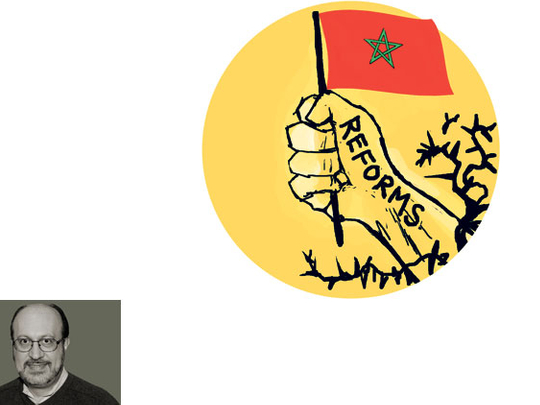
The space of an opinion essay is too short to analyse a constitution composed of 180 articles but in the current melee of epochal changes throughout the Arab World, the landmark proposal issued in Rabat on June 17, stands out for its ambition.
King Mohammad VI, M6 for the vast majority of Moroccans, emphasised the introduction of serious changes that included: the empowerment of an elected parliament, a strengthened prime ministership, a mandate to create an independent judiciary, guarantees to provide equality for women and, above all, efforts to reinforce the position of the monarch both as king as well as Commander of the Faithful.
While supporters concluded that the monarch was reducing some of his political powers, in reality, the king—whose status would be "inviolable" — saw to it that his real powers were either maintained or strengthened. For the 46-year-old king, who acceded to the throne in 1999, the new constitution distinguished between his roles as the political head of state and as the leader of the country's religious communities.
As Commander of the Faithful and President of the Higher Council of the Ulema, an institution which will now be elevated to the constitutional rank even if the term ‘sacred' is deleted, the king reserved for himself and his successors the right to referee. Clearly, this means that the sovereign will be even stronger than before.
In fact, Article 19 of the current constitution (1996), which stipulates that "The king, ‘Amir Al Mu'minin' (Commander of the Faithful) shall be the Supreme Representative of the Nation and the Symbol of the unity thereof. He shall be the guarantor of the perpetuation and the continuity of the State. As Defender of the Faith, he shall ensure the respect for the constitution. He shall be the protector of the rights and liberties of the citizens, social groups and organisations. The king shall be the guarantor of the independence of the Nation and the territorial integrity of the kingdom within all its rightful boundaries," will not change.
Unlike counterparts in Spain, or any number of European monarchies, he was not ready to become merely a symbol for the nation. Rather, while he wished to introduce some reforms, his constitution (Article 19) within the "new constitution" was solid as rock.
Political system
Needless to say that pro-democracy activists perceived this latest offer as being inadequate for Morocco in the 21st century. Members of the February 20 Movement, which organised demonstrations that literally shook the Sharifian monarchy, insisted that greater changes to the country's political system were necessary.
Still, while few dissenters relented, most acknowledged that several positive changes were included even if the wish was for more. The major development concerned the prime minister, who will now preside over cabinet meetings without the monarch's presence, dissolve parliament, and be known as the ‘president of the government'.
Equally valuable are the various freedoms guaranteed under the law along with the adoption of a sacrosanct independent judiciary, which literally divides the nations of the world between those who accept separations of powers and those that skirt around them.
Perhaps the most practical change is the decriminalisation of the Amazigh (Berber) language — by making it the second official language of the kingdom alongside Arabic — and to reinforce the Hassani culture, which is a characteristic feature of the Saharan provinces in the South.
The king insisted that these measures entrenched democratic institutions, protected existing rights, and added new ones. Activists remained sceptical since Morocco's 400-year-old monarchy was not the paragon of genuine reforms, especially as the ruler would still be able to pass his own decrees, retain a firm grip on security, command the army and supervise religious matters, three legitimising functions that reinforced the longest ruling dynasty in the Arab world.
Like the vast majority of Arabs, Moroccans are clearly fed up with rampant corruption that created ossified governments, most of which forgot how to serve their citizens. Revelations of widespread greed, in Rabat as elsewhere, coupled with the absence of accountability, meant that fraud became rampant throughout the many institutions that functioned helter-skelter. Courts, businesses, health services, even higher education varsities churned out rulings, provided care, and granted diplomas for the right "price."
This is what most Arabs want to change. Moroccans would like to see their country become a real democracy, and while few dare to contemplate a British model, most look enviously at Turkey, the UAE, Oman, or even Lebanon, as satisfactory interim paradigms.
To his credit, the king tackled thorny issues, which may well make a difference down the road. Few doubt that the hastily convened referendum was likely to pass especially as Moroccans — 44 per cent of whom are illiterate — would not know what they are voting for.
It now remains to be seen whether these reform programmes will be implemented or whether they will join those introduced some 12 years ago, when the king promised to improve women's rights, liberalise the economy, end tribal and ethnic divisions, respect human rights, encourage diversity, and promote the secular rule of law as a compatible framework with Islam.
For the king, the choice is now evident: accelerate reforms even if the goal is not the birth of a genuine constitutional monarchy.
Dr Joseph A. Kechichian is a commentator and author of several books on Gulf affairs.












